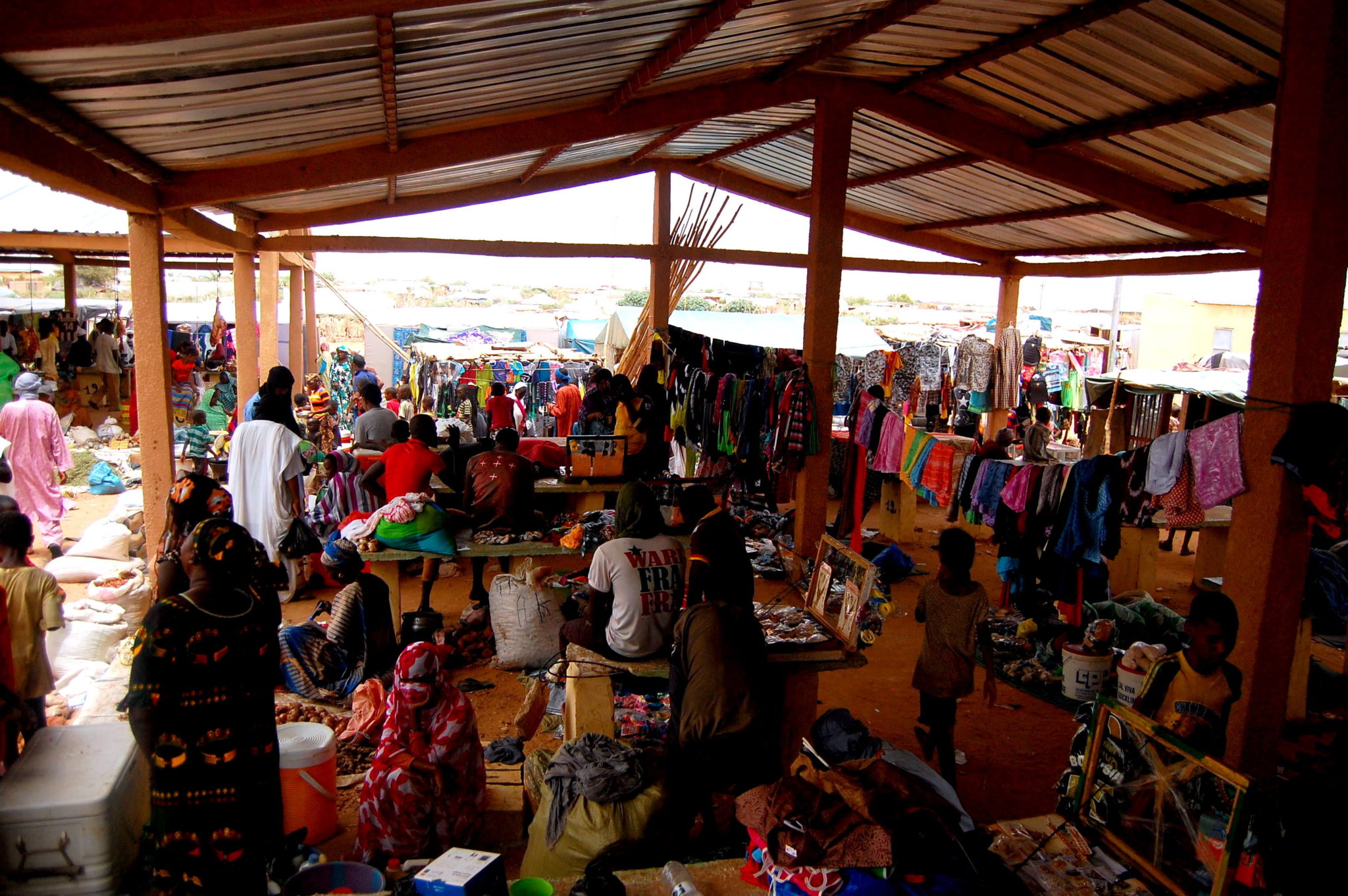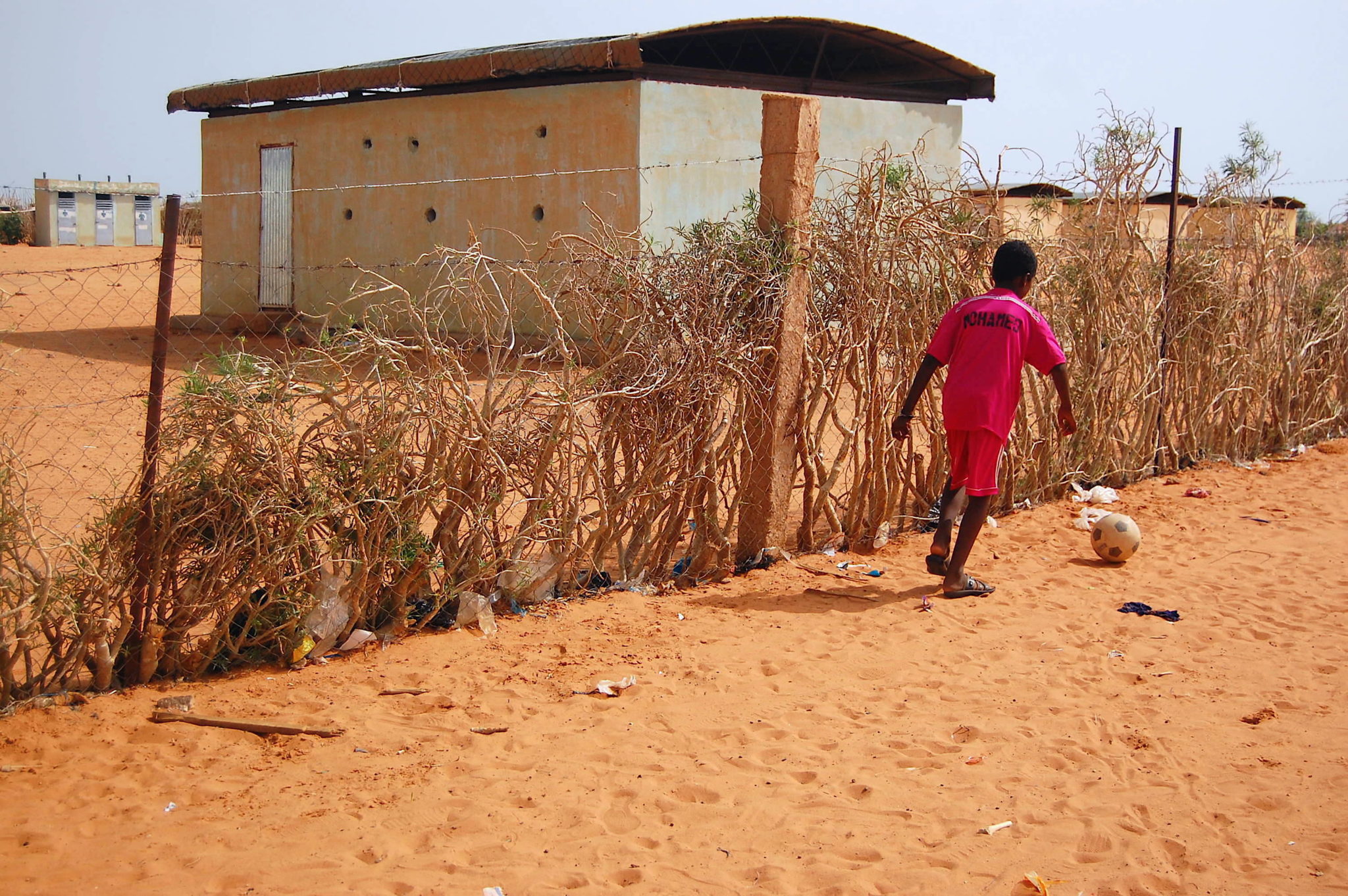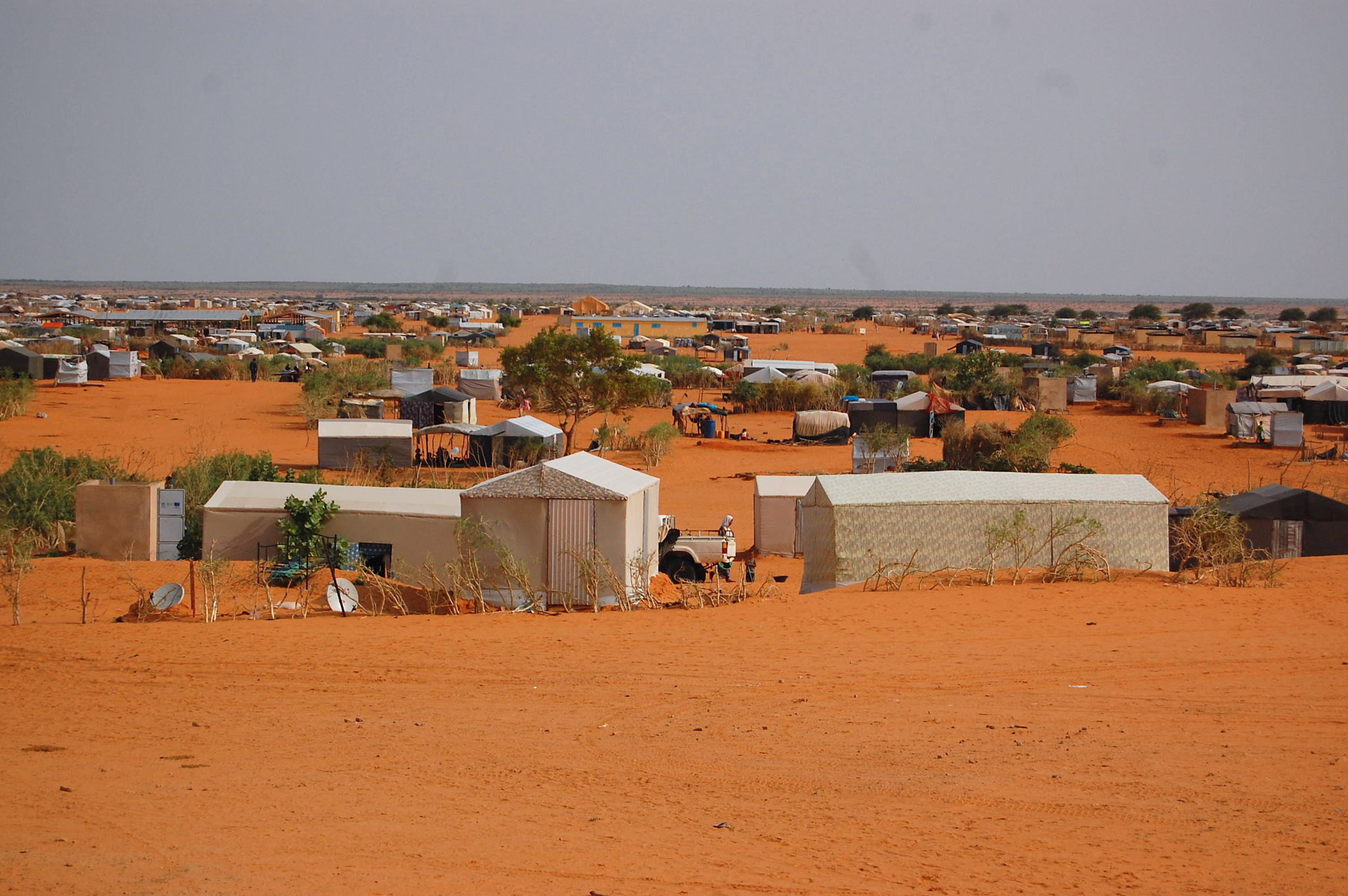Mbera refugee camp, Mauritania – Nana Mint Cheybani has abandoned the thought of going back to Mali.Life in Mbera refugee camp, on the southeast corner of Mauritania, a desert country on the coast of West Africa, is tough. Tensions between refugees and locals regularly flare up over access to local resources and the camp suffers from chronic underfunding.The vast camp is sparse: refugees live in under tarps affixed to wooden beams, or in rudimentary, one-room brick structures they have built themselves. Tree branches stick out from the mounds of sand, serving as fences between the families’ plots.Many of the refugees in the camp were nomadic herders in Mali. Without their livestock or other job opportunities, they rely almost entirely on aid. Many say they have trouble supporting their families in the camp.But at least it’s safe, says Mint Cheybani, an elderly woman who sits on a committee that works to keep the peace between Malian refugees and local Mauritanians. She explains that not a day goes by that she doesn’t hear about a violent attack in Mali.“We’d rather the Mauritanians beat us here, than return to Mali,” she says.“There, they will kill us.” That’s a popular refrain among refugees in Mbera camp, which today is home to about 52,000 Malians. Most families in the camp were displaced in 2012, when an armed uprising in northern Mali forced tens of thousands from their homes.Armed rebel groups and secessionist forces, which have for decades complained of unequal access to services and a lack of decentralized, decision-making power in the north, pushed government forces out of the area.More than 15,000 armed military and police personnel have been deployed under the UN peacekeeping mission in Mali, known as MINUSMA. Troops from several countries, including France, Germany, Guinea, Niger and Chad, are on the ground.It’s against this backdrop that Canada is weighing its own peacekeeping options, more than a year after Prime Minister Justin Trudeau promised that “Canada is back” on the world stage. Mali may figure prominently in those plans, despite concerns about what Canadian boots on the ground could actually achieve in a complicated, drawn-out conflict involving al-Qaeda, local separatists, tribal militias and international smugglers.In August 2016, Trudeau said Canada would devote 600 troops, 150 police officers and $450 million to support UN peacekeeping operations over the next three years.“It is important that when we go into engagements internationally that we be clear-eyed around what we hope to deliver,” Trudeau said at the time.
That’s a popular refrain among refugees in Mbera camp, which today is home to about 52,000 Malians. Most families in the camp were displaced in 2012, when an armed uprising in northern Mali forced tens of thousands from their homes.Armed rebel groups and secessionist forces, which have for decades complained of unequal access to services and a lack of decentralized, decision-making power in the north, pushed government forces out of the area.More than 15,000 armed military and police personnel have been deployed under the UN peacekeeping mission in Mali, known as MINUSMA. Troops from several countries, including France, Germany, Guinea, Niger and Chad, are on the ground.It’s against this backdrop that Canada is weighing its own peacekeeping options, more than a year after Prime Minister Justin Trudeau promised that “Canada is back” on the world stage. Mali may figure prominently in those plans, despite concerns about what Canadian boots on the ground could actually achieve in a complicated, drawn-out conflict involving al-Qaeda, local separatists, tribal militias and international smugglers.In August 2016, Trudeau said Canada would devote 600 troops, 150 police officers and $450 million to support UN peacekeeping operations over the next three years.“It is important that when we go into engagements internationally that we be clear-eyed around what we hope to deliver,” Trudeau said at the time. Mali has figured at the top of the list of places where Canada could deploy troops. Defence Minister Harjit Sajjan, and officials from National Defence and Global Affairs Canada have visited the country over the last year.The Democratic Republic of Congo, Central African Republic and South Sudan have also been mentioned as possibilities.At the time of his trip to Mali in November 2016, Sajjan said the visits were “invaluable in providing us with the information we need about the region and the challenges it is facing from a peace and security standpoint.”“As Canada continues to assess how we can make the most noteworthy contribution to international peace and security, we continue to carefully examine the security situation in Africa,” the minister said in a statement.A decision on a Canadian peacekeeping mission to Mali or elsewhere on the African continent was expected by the end of 2016. But nothing has been confirmed to date and Ottawa’s response to questions about the delays has been vague.It says it needs to assess the situation on the ground. It also signaled that political developments in the United States and elsewhere, including the elections of Donald Trump and Emmanuel Macron in France, and the Brexit vote, might have played a role in delaying peacekeeping plans.A decision on a Canadian peacekeeping deployment is not likely before mid-November, Dorn said, which is when Canada will host a UN peacekeeping conference in Vancouver.Expected to draw hundreds of delegates from 70 different countries, the conference will look at UN peacekeeping goals and “focus on securing new pledges” for such operations.“The irony is that the Vancouver ministerial is about pushing nations to keep their pledges and to make new ones. How can Canada make new pledges if it hasn’t fulfilled the previous ones?” Dorn said.Warring rebel factions and the Malian government signed an interim peace agreement in 2015.The deal was deliberately vague to get all the parties to sign on, explained Marie-Joëlle Zahar, a professor at the Université de Montréal who studies Mali.To date, few of the terms, which include disarmament, constitutional reforms, and a return of state institutions to the north, have been implemented. Ongoing insecurity in the north is the most obvious challenge, she said.On Sept. 24, three UN soldiers were killed when their convoy hit an explosive device in northern Mali. A month earlier, armed men attacked the MINUSMA headquarters in Timbuktu, killing eight.UN forces don’t have the resources they need to cover all of northern Mali in a way that will make local people feel secure, Zahar said. They are also operating among a largely distrustful local population.
Mali has figured at the top of the list of places where Canada could deploy troops. Defence Minister Harjit Sajjan, and officials from National Defence and Global Affairs Canada have visited the country over the last year.The Democratic Republic of Congo, Central African Republic and South Sudan have also been mentioned as possibilities.At the time of his trip to Mali in November 2016, Sajjan said the visits were “invaluable in providing us with the information we need about the region and the challenges it is facing from a peace and security standpoint.”“As Canada continues to assess how we can make the most noteworthy contribution to international peace and security, we continue to carefully examine the security situation in Africa,” the minister said in a statement.A decision on a Canadian peacekeeping mission to Mali or elsewhere on the African continent was expected by the end of 2016. But nothing has been confirmed to date and Ottawa’s response to questions about the delays has been vague.It says it needs to assess the situation on the ground. It also signaled that political developments in the United States and elsewhere, including the elections of Donald Trump and Emmanuel Macron in France, and the Brexit vote, might have played a role in delaying peacekeeping plans.A decision on a Canadian peacekeeping deployment is not likely before mid-November, Dorn said, which is when Canada will host a UN peacekeeping conference in Vancouver.Expected to draw hundreds of delegates from 70 different countries, the conference will look at UN peacekeeping goals and “focus on securing new pledges” for such operations.“The irony is that the Vancouver ministerial is about pushing nations to keep their pledges and to make new ones. How can Canada make new pledges if it hasn’t fulfilled the previous ones?” Dorn said.Warring rebel factions and the Malian government signed an interim peace agreement in 2015.The deal was deliberately vague to get all the parties to sign on, explained Marie-Joëlle Zahar, a professor at the Université de Montréal who studies Mali.To date, few of the terms, which include disarmament, constitutional reforms, and a return of state institutions to the north, have been implemented. Ongoing insecurity in the north is the most obvious challenge, she said.On Sept. 24, three UN soldiers were killed when their convoy hit an explosive device in northern Mali. A month earlier, armed men attacked the MINUSMA headquarters in Timbuktu, killing eight.UN forces don’t have the resources they need to cover all of northern Mali in a way that will make local people feel secure, Zahar said. They are also operating among a largely distrustful local population. Many Malians in the north, a vast area that comprises only 15 percent of the country’s total population, don’t believe the UN is impartial, Zahar said, while people in the country’s south, home to 85 percent of citizens, resent the UN presence in Mali altogether.“It becomes very difficult for the mission to be able to do anything meaningful in the country because they’re walking on [egg shells],” she said.Dorn, who visited northern Mali in July, told VICE News that Canada’s international allies, like France and Germany, which are both active in Mali, would like to see Canadian forces get involved.“If we were to provide a fairly large force package and several hundred troops and equipment, we could also get the force commander position, which would be a real feather in the hat for Canada,” Dorn said.Zahar, however, isn’t convinced sending ground troops “would be able to make a difference”.She said that instead, Canada could send resources that are needed, and might be more effective on the ground, including field support and military intelligence analysis. That’s the ability to understand who groups are, how they operate, and what links exist between the factions.“Military intelligence analysis is absolutely crucial in a place like Mali where you have a political conflict overlaid with criminal and terrorist network activity,” Zahar said.She expects Canada to get involved in some way in Mali and to make an announcement soon. But she doesn’t expect that announcement to reflect the government’s earlier promise.“To the extent that I actually know the difficulties of the country, I have to say I applaud thinking strategically about what can really be done instead of rushing in,” she said.Meanwhile, back in Mbera camp, few refugees wanted to talk about the UN mission or international military involvement in the conflict in Mali. For many, going home for good feels like a distant dream.“I don’t want to return to war,” said Tesayet Walet Mohamed, an elderly woman, without hesitation. “If we can confirm that peace is everywhere across Mali, we won’t wait for anyone” to go back.She paused. “But that’s not easy.”Jillian Kestler-D’Amours reported from Mauritania on an International Reporting Project fellowship.
Many Malians in the north, a vast area that comprises only 15 percent of the country’s total population, don’t believe the UN is impartial, Zahar said, while people in the country’s south, home to 85 percent of citizens, resent the UN presence in Mali altogether.“It becomes very difficult for the mission to be able to do anything meaningful in the country because they’re walking on [egg shells],” she said.Dorn, who visited northern Mali in July, told VICE News that Canada’s international allies, like France and Germany, which are both active in Mali, would like to see Canadian forces get involved.“If we were to provide a fairly large force package and several hundred troops and equipment, we could also get the force commander position, which would be a real feather in the hat for Canada,” Dorn said.Zahar, however, isn’t convinced sending ground troops “would be able to make a difference”.She said that instead, Canada could send resources that are needed, and might be more effective on the ground, including field support and military intelligence analysis. That’s the ability to understand who groups are, how they operate, and what links exist between the factions.“Military intelligence analysis is absolutely crucial in a place like Mali where you have a political conflict overlaid with criminal and terrorist network activity,” Zahar said.She expects Canada to get involved in some way in Mali and to make an announcement soon. But she doesn’t expect that announcement to reflect the government’s earlier promise.“To the extent that I actually know the difficulties of the country, I have to say I applaud thinking strategically about what can really be done instead of rushing in,” she said.Meanwhile, back in Mbera camp, few refugees wanted to talk about the UN mission or international military involvement in the conflict in Mali. For many, going home for good feels like a distant dream.“I don’t want to return to war,” said Tesayet Walet Mohamed, an elderly woman, without hesitation. “If we can confirm that peace is everywhere across Mali, we won’t wait for anyone” to go back.She paused. “But that’s not easy.”Jillian Kestler-D’Amours reported from Mauritania on an International Reporting Project fellowship.
Advertisement

A coup d’etat followed in Bamako, the capital, and instability persists on several fronts today.By the end of last year, nearly 140,000 Malian refugees were spread across the neighbouring countries of Mauritania, Burkina Faso and Niger.An international, United Nations-led peacekeeping force is struggling to provide stability amid fighting between armed, rebel groups, some of which are affiliated with Al-Qaeda, and Malian government troops, despite an interim peace deal.An international, United Nations-led peacekeeping force is struggling to provide stability amid fighting between armed, rebel groups
Advertisement
Canada pledges 600 troops, $450 million

Advertisement
A spokesperson for National Defence referred VICE News to Global Affairs Canada for comment on any possible peacekeeping missions.“Canada has made clear its intent to increase its engagement in the full spectrum of multilateral peace operations and we are carefully weighing our options with respect to engagement,” Global Affairs Canada Spokesperson Brittany Venhola-Fletcher said in an email.“No decision has been finalized at this time,” she said.The Canadian military was ready to deploy to Mali months ago, but political officials dithered, said Walter Dorn, a professor of defence studies at the Royal Military College of Canada in Kingston, Ontario“How can Canada make new pledges if it hasn’t fulfilled the previous ones?”
Advertisement
UN forces struggling
“The north of Mali continues to be a zone in which different groups [and] different clans clash periodically, where the UN troops come under attack,” Zahar told VICE News. “Because there’s no real governance of the border, transnational criminal and terrorist networks continue to operate.”Since its launch in 2013, the UN mission in Mali has become the deadliest active peacekeeping operation for UN forces in the world. By the end of August, 133 MINUSMA troops have been killed.By the end of August, 133 MINUSMA troops have been killed.
Advertisement

International pressure on Canada
“Military intelligence analysis is absolutely crucial in a place like Mali where you have a political conflict overlaid with criminal and terrorist network activity”
Advertisement